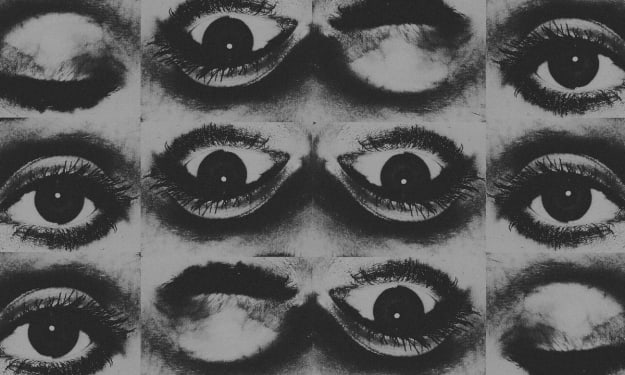When The Pursuit Of Happiness Makes You Unhappy
When The Pursuit Of Happiness Makes You Unhappy

If we are ready to let go of life, we can plan for life that is already waiting for us elsewhere.
One of the earliest memories I have is circling the turntable and Simon & Garfunkel's Mrs And I remember being enchanted by the music.
I made my public singing debut in third grade with Kenny Rogers "mega-hit" Gambler. ". I sang it a cappella during a school assembly, even though I didn't know the words.
At home, I devoured cassettes of pop show tunes and my fathers "classic oldies, and at the age of nine, I began to build my own collection of the Top 40 hard rock of the early 1980s. For fun I made up my own songs and wrote lyrics in a notebook.
After begging for a long time I got a guitar at the age of thirteen and started my lessons. After discovering The Beatles that year, music became nothing less than an obsession. I practiced, I paid for the lessons with a job I took at the ripe age of fourteen in a local record store (they hired me again a few years later), and I began my first serious attempt at songwriting.
Music became my way of softening the typical insecurities you bring with you as a young person. Being in front of my peers in social situations tended to generate a lot of positive attention, which fed my insatiable appetite for success more than anything else. My musical heroes provided such joy, comfort, catharsis and inspiration during my teenage years that it was only natural that I emulated them and developed an overwhelming desire for my own music career.
When I was in college, I strolled around my dorm with a guitar and offered spontaneous concerts that everyone could hear. They were a great way to try out new material and to connect with others, and there are few things in life that bring me so much joy as singing and playing. I remember coffee house concerts that I played on campus and that received positive reactions at every turn. In this sense, music and entertainment became not only my passion, but what made me feel worthwhile. Because I appreciated doing what I loved, and because of the euphoric high, I looked for performance opportunities, both formal and informal.
The guitar is not a superpower, and it is wonderful. But it is no small thing, and that is why I am here.
After college, I moved to Nashville, a mecca for songwriters of all stripes, and immersed myself in the music scene. I wrote new songs and performed every night as an author in Nashville, made friends and shared an apartment with like-minded musicians. I recorded studio demos that were rejected or ignored by seventy-five different record companies. I lived and worked as a day labourer because I had to devote most of my energy to making music instead of trying to get my career going.
These rejections, partly due to the firing process, made me feel a spiritual connection with my heroes who had undergone similar trials on the way to ultimate success. My closest songwriter friends and I, in our own mutual admiration and inspiration, became a society that helped each other to withstand the shields and bows essential to a career in the difficult and volatile music industry.
On Sunday morning I received a call from the DJ who was hosting a show on my favorite local radio station, Lightning 100. He was ready for the evening.
He liked the demo I sent him, and I did, and that's all it takes. And that was it.
To my amazement, I was on the 30th floor of the L & C Tower in downtown Nashville that same day, right next to the King of the World, and was watching the city when the interview aired. The DJ played two or three songs from my demo on the airwaves during my visit. I screamed into the car and made my way to my closest friends "homes so they could listen at home and share my giddy excitement.
Without the support or interest of a record company, I eventually financed and supervised the recording and production of a full-fledged studio album, while full-time. To make matters worse, I became the manager of a one-man record company and booking agent, operating from my bedroom and sending copies of finished CDs to 90% of college radio stations and newspapers. When the album was finished, I set up my own little label to release it and quit my day job to concentrate fully on working on the album and listening.
I followed them on the phone in the 90s, hoping to secure airplay, reviews and gigs. I contacted hundreds of colleges and universities on the East Coast (the concentration was high) and booked my own tours.
The idea was to play as many gigs as possible in small and big schools, take me from one to the next, sell CDs and build a mailing list on the side. This would allow me to make a living from what I loved, in the hope of gaining greater notoriety, building a fan base and building a solid career as a musician and performer.
It was an exciting time, but stressful and intense, as all this can be, sometimes even more than it should be.
I have had radio appearances all over the country and received reviews for the CD, but not many. On the practical side, I figured that if the attention that the CD did not attract, I would have to experience life on the street, and that, so to speak, I would probably at least reach break-even. I accumulated debt and had to work harder than I ever had to to to make my dream a reality.
In the months after the school finally gave me the green light to send out my promotional materials, things looked bleak. My contacts changed hands, students in unpaid roles and promising deals fell through. In the end, for all my efforts, I only had one single booking for a show.
That was the magnitude of my tour. I didn't expect such dismal results and the toll they would take on me. I was exhausted in every way possible. But most importantly, my mind took a toll.
I believed that if I worked hard enough, I could succeed, at least on a modest level. I never expected the rejections that were piling up, but I stopped trying because it was the only thing I wanted to do with my life. It seemed like I had no choice. I had to get out of bed and do something else.
I learned that I had to share the rent with my roommates because it was not paid by the landlord. A note I found showed that we had many months of delinquency and faced possible eviction at any time.
I had to find a new home. All this harassment would have been doable if I had been my normal self.
After a phone call with my mother, she said, "That's not where I'm from," and that was it.
The biggest testament to my desperate state was that I couldn't think of a better option. I had lost my way, my direction, my purpose, my drive. I moved away from my childhood and I had to move away.
A big part of my self-esteem was tied to my success as a musician. I had defined myself through my identity and my aspiration. Now I was without both. I struggled to accept it, and found that I had no energy left, zero to invest in my dreams. The immediate task was to climb out of the depression.
It took me a few years to finally feel the urge to reconnect in a way that reflected my natural enthusiasm with life. The desire to resume my music career was gone. The beginning of regaining some emotional and financial stability outside of the boring office job helped me take tentative steps in a new direction.
I enrolled in a few community college classes, including an acting class for fun, which prompted me to try community theater. Hiking was a key factor in my recovery, so I joined the Delaware Valley chapter of Appalachian Mountain Club and started hiking with a group of other people who took me into nature. This led to invited backpacking trips, which proved life-changing and triggered a great love of nature.
Feeling better and getting a sense of opportunity for myself again, I moved to California and did a lot of exploration. There I met an incredible partner and got married. Twenty years later, I am doing things I never thought I would do, broadening my range of interests and experiences in ways that still surprise my younger self. In other words, I have made life better for myself and become a happier person who has never fulfilled my dream of being a professional musician, but has achieved considerable career success in other fields.
I never stopped loving music. I shared my passion for this with numerous guitarists, I played as a volunteer for hospital patients, I was enthusiastic about small venues, concert goers and fans of more artistic styles, I developed my own skills on the guitar and even took classical piano lessons. Over the years, I performed in various settings and paid for my love of music. The difference, I learned, was that I loved the success that the outside world of the music business lacked. Even after I gave up my pursuit of music for a living, I never stopped loving music.
The Buddha taught that all our suffering stems from attachments. We all aspire, to varying degrees, to external recognition, appreciation, recognition and validation by others, because it is pleasant to receive them.






Comments
There are no comments for this story
Be the first to respond and start the conversation.